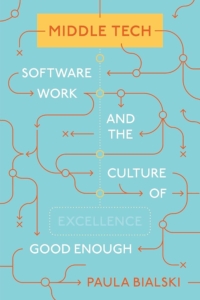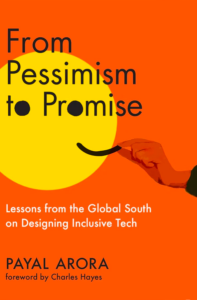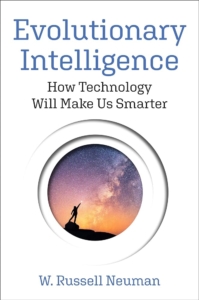“Middle Tech: Software Work and the Culture of Good Enough” with Professor Paula Bialski
Contrary to the widespread belief that all technology is sleek, flawless, and cutting-edge, much of it isn’t designed to meet such high standards or be revolutionary. In many environments, the goal isn’t always to create perfect, futuristic products. Instead, the focus is often on functionality—producing tech that is good enough to meet immediate needs without striving for perfection. This mindset contrasts with the image of the tech world as a space of constant innovation, where every new development is expected to disrupt industries and change lives. Instead, in many cases, the aim is to simply keep things running smoothly, making sure the technology works well enough to get by, while knowing that it will likely be improved or replaced in the next version. In her book “Middle Tech: Software Work and the Culture of Good Enough” Professor Paula Bialski explores this idea through an ethnographic study of software developers working at a corporate tech company. In this episode of Bridging the Gaps, I speak with Professor Paula Bialski.
Paula Bialski is associate professor of digital sociology at the University of St. Gallen in St. Gallen, Switzerland.
We begin our discussion by exploring why Paula chose to conduct her study at a mid-sized software development company, rather than focusing on the world’s top tech firms with their sleek offices and cutting-edge facilities. This choice allowed her to investigate a more grounded and realistic aspect of the tech industry. From there, we dive into how she conducted her research—how she embedded herself with the developers and built rapport to understand their day-to-day work and culture.
A major focus of our conversation is the concept of “good enoughness” in corporate software development. Paula explains how this mindset shapes the way tech workers approach their tasks, balancing functionality and time constraints over perfection. I ask her if “good enough” can sometimes become a way to avoid striving for excellence, or even an excuse for sloppiness, which leads us to a broader conversation about how developers navigate this balance.
We also discuss the challenges software engineers face at work, such as dealing with outdated systems, tight deadlines, and corporate expectations, and how these challenges compare to those in other professions. We also touch upon the challenges they face in their personal space. Paula gives insight into how the fast-paced culture of the tech world, where professionals often move quickly from one job to the next, influences the work environment.
Finally, we briefly touch on Paula’s upcoming project, which will examine the impact of AI on software development—a topic that promises to provide new insights into how technology will continue to shape this field. It has been a fascinating conversation that sheds light on a side of the tech industry not often discussed.
Complement this discussion with “The AI Playbook: Mastering the Rare Art of Machine Learning Deployment” with Eric Siegel. And then listen to Augmented Thinking: The New Convergence of Art, Technology, and Science with Professor Julio Ottino




Connect With Us